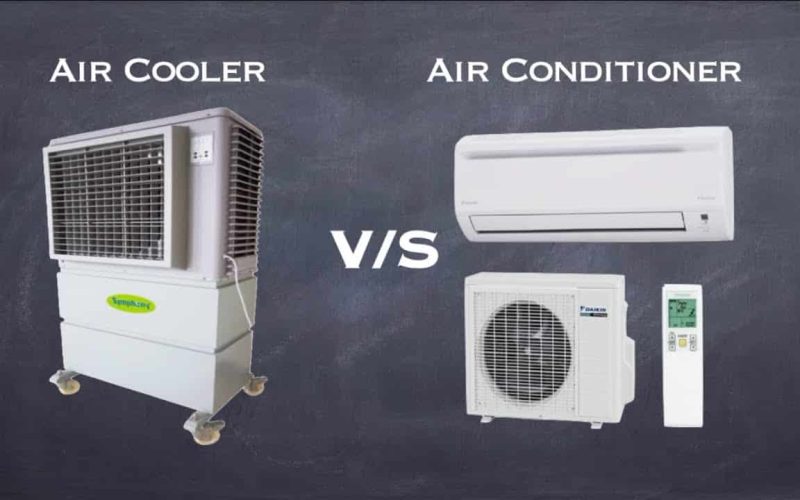An electric fan is probably the cheapest cooling option, but if you want something better, you can get an air cooler or air conditioner.
The main difference between air coolers and air conditioners is how they achieve the cooling effect.
Both devices use electricity to operate and help cool indoor air, preventing sweating and allowing people to live comfortably, even when scorching outside.
Both machines provide fresh air, although there is a complete difference between air coolers and air conditioners and a difference in their work mechanisms.
Definition of Air Cooler
As the name suggests, an air cooler cools the air by making it more humid.
It uses an evaporation technique to help produce cool air, and the temperature of dry air can be dropped by passing it through liquid water to produce water vapor.
They are available in different sizes, large to small and even medium. They are typically used in buildings to cool any room at a designated temperature with fresh, filtered outside air.
Air coolers are used to cool an area for comfort purposes. They are widely used in developing countries and nations with warm and humid climates.
Work Mechanism of an Air Cooler
Air coolers work with the principle of evaporation. They comprise three main components: the fan, the water tank, and the pads.
The water tank capacity varies; it could be 5 liters or more. You fill the tank with water, and the pads absorb the water, thus soaking it.
When switched on, the air cooler brings in hot air through the fan, which is then cooled down by the water. Thus, cooler air is created and released into the room.
Definition of Air Conditioner
An air conditioner, on the other hand, is an alternative cooler. It is commonly known as an A/C and is a cooling system used to lower the temperature in a room by removing heat and moisture and replacing it with cool air.
The air conditioner can produce hot and cold air, control humidity and air conditions, and keep the internal temperature very comfortable.
The term air conditioning means changing the properties of the air, temperature, and humidity into more favorable or pleasant conditions.
Work Mechanism of an Air Conditioner
Air conditioners circulate internal hot air from the room into its vent and then cool down the hot air with their cooling system or refrigerant.
Any excess moisture or hot air is passed through the coiled tube attached to the A/C and expelled outside into the atmosphere.
The cold air converted from the hot air is then passed through the front unit of the A/C into the room.
There are different types of air conditioners, and choosing the right type depends on your preference, how large the area it is needed for, and other factors.
The most common different types include;
- The split unit air conditioning system is the type most suitable for homes.
- Also, there is the packaged air conditioner. This type is more suitable for larger buildings or larger homes.
- Lastly, the most common type of air conditioning system is the central one, suitable for offices and gyms.
Other types include “the window air conditioner, portable air conditioning unit, etc.
Air coolers and air conditioners may seem similar because, in the end, they both provide more relaxed space or cooler air to rooms and their inhabitants.
Read on to find out the typical difference between air coolers and air conditioners and why you should choose an air cooler over an air conditioner.
Notable Difference Between Air Coolers And Air Conditioners
Time of Invention
Air coolers were introduced in 1929, whereas air conditioners were invented in 1902 by Willis.
Quality of Air
An air cooler pulls fresh air from outside and then cools it down.
In contrast, an air conditioner repeatedly circulates the internal air in a room. It pulls in hot air from the room and replaces it with cooler air.
Portability
Another apparent difference between air coolers and air conditioners is their portability. Air coolers are portable.
They are not usually installed in a fixed place and can be moved around when needed. Many air coolers come with a castor wheel, which makes them easily portable.
Unlike air conditioners, which are not portable, they are usually installed in a specific area, like on a wall, which doesn’t require them to be moved from one place to another.
Temperature
Air conditioners can lower temperatures significantly below the ambient level.
The air cooler has limits and can only lower the temperature a few degrees below room temperature.
Some people improve efficiency by using chilled water or putting ice in the water source.
It still isn’t as cold as the air conditioner, but it can lower the temperature a few more degrees.
Eco-friendliness
Unlike air coolers, air conditioners use chemical coolants or refrigerants such as chlorofluorocarbon and hydrofluorocarbon, which can harm the environment.
Air coolers use water as their refrigerant, which makes them eco-friendly. They do not use any harmful cooling agents as air conditioners do.
Maintenance
Air coolers require more maintenance than air conditioners. You must fill your air cooler with water daily before using it. On the other hand, air conditioners only need a bit of service occasionally.
Effectiveness
Air coolers aren’t as effective at cooling a room or space faster. It takes a longer period to bring down the temperature of a room.
They can also not be used in large places or places with many crowds. Air conditioners are more effective and can be used in large spaces.
Budget-friendliness
Another notable difference that would be important to mention is their effect on a budget.
Air conditioners are known for their heavy impact on electricity. They consume a lot of power to work, which leads to high bill payments.
Air coolers use about 75 – 80% less energy than air conditioners. That is, it consumes a lesser amount of power to work.
Humidity
Air coolers tend to increase the humidity in the room where they are used. This is because it evaporates water into the air.
Therefore, it is not recommended in humid areas; a humid environment is said to slow down the evaporation process of air coolers.
In comparison, an air conditioner reduces the humidity of the air as water vapor condenses around the cooling coils; a good indicator of this is how air conditioners drip water outside.
You can use air conditioners regardless of the humidity in the room.
Value Of Money
Air cooler scores more when it comes to the value of money. Air coolers are sold at a lower price as compared to air conditioners.
Climate
Air coolers are designed to not work well in humid climates. This means they can not be used in coastal areas. On the other hand, air conditioners can be used in both dry and humid climates.
Healthwise
Air coolers are better for people with allergies or respiratory problems. When air conditioners are not cleaned, they might lead to respiratory problems due to dust accumulation in their vents.
Space
Unlike Air conditioners, air coolers take up space, which makes consumers reluctant to purchase them. Industries are also modifying air coolers to fit into people’s spaces.
Comfortability
The moist air produced by air coolers eventually becomes uncomfortable. Air conditioners produce rather drier air that doesn’t cause any discomfort.
Ventilation
Air coolers depend on air from the atmosphere to provide a cooling effect.
Thus, when there is insufficient ventilation, air coolers do not function.
On the other hand, air conditioners do not depend on ventilation. They work anywhere and anytime.
In conclusion, air cooler sales have increased rapidly worldwide in many countries. The increasing demand can be seen in companies that provide good products at low prices.
With all the differences between air coolers and air conditioners, deciding which is best for you should not be difficult.





